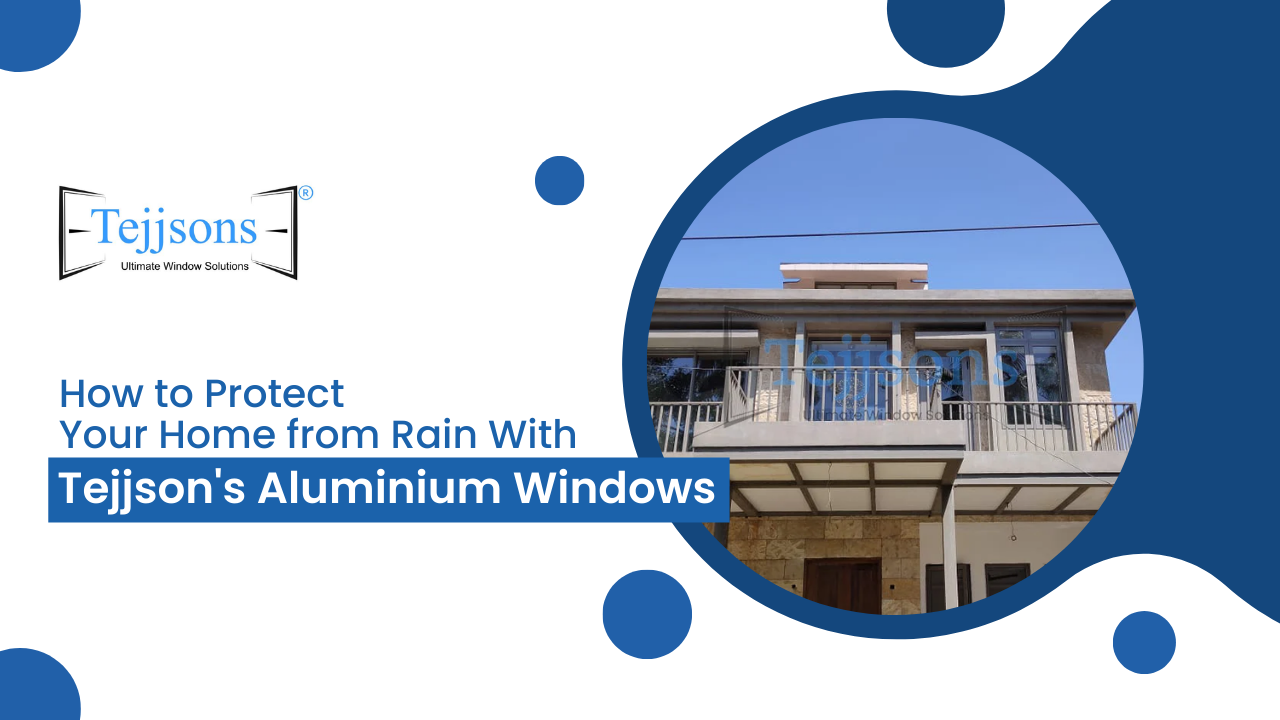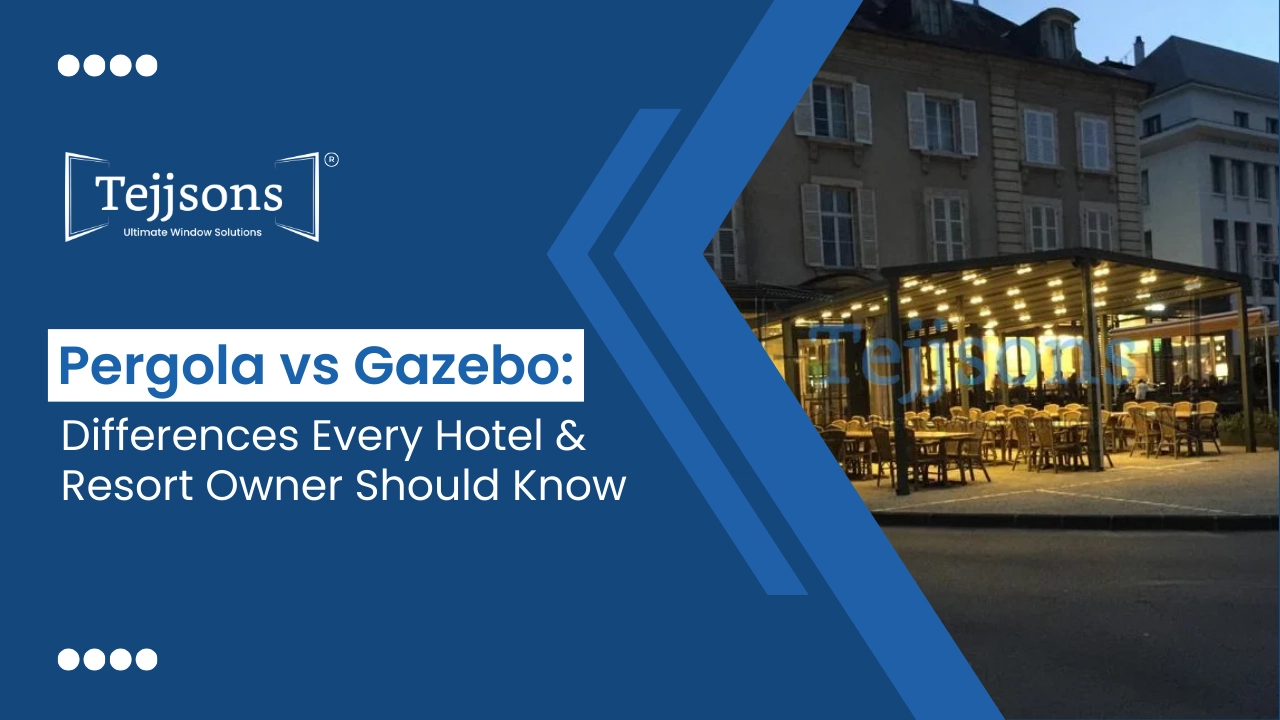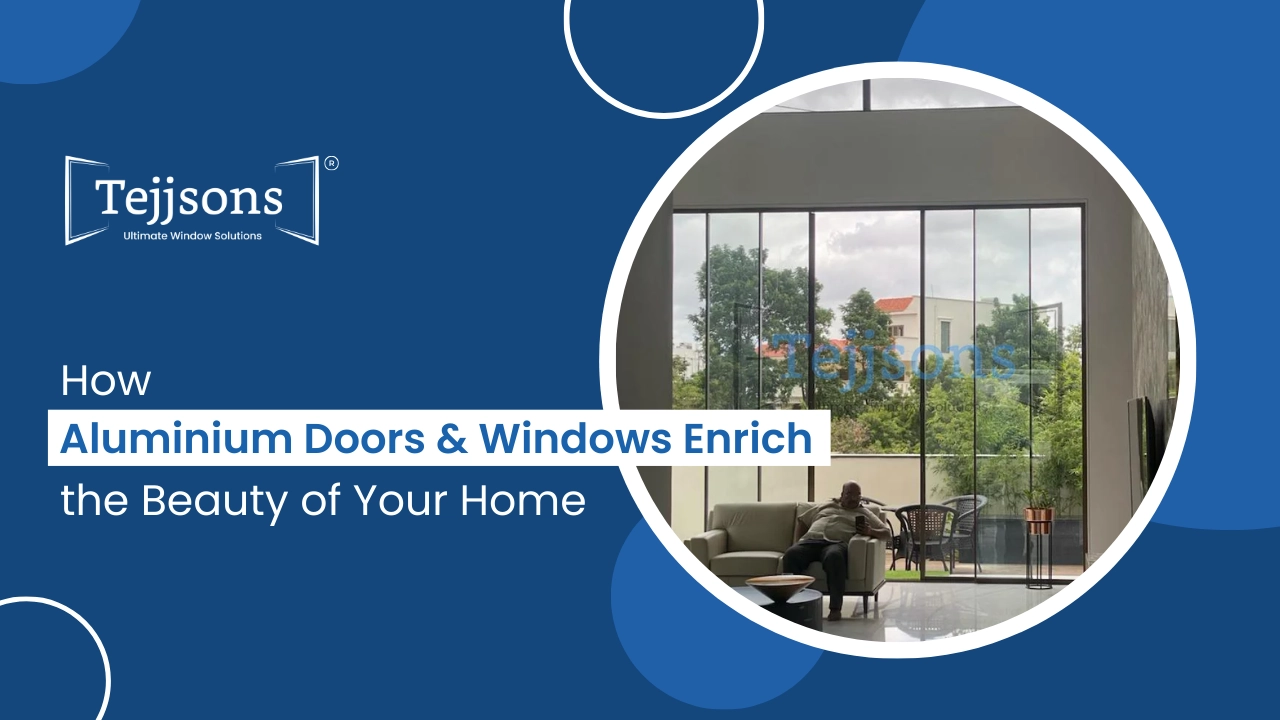Rain doesn’t just wet your windows. It seeps, stains, corrodes, and warps, especially when your home relies on outdated designs or poorly sealed fittings. For modern homes, rainproof aluminium windows are no longer optional. They’re a necessity.
At Tejjsons, we’re amongst the top aluminium window manufacturer and one of the reasons behind our popularity is that we don’t build for fair weather. Our aluminium sliding windows and other types of premium aluminium windows are designed to keep monsoon troubles out, be it in high-rise apartments, sea-facing villas, or sprawling bungalows. This guide breaks down how to pick the right aluminium windows and why it matters more than you think.
Table of Contents

Why Rain Protection Should Be a Priority in Window Design
Not all aluminium windows are built to handle the kind of weather India throws at them. Torrential rains, strong winds, coastal salt spray, these aren’t just occasional annoyances. They’re consistent threats to your interiors, furniture, and walls.
Rainwater leakage can:
- Damage paint, wood, and internal wiring
- Trigger mold and mildew growth
- Compromise insulation and energy efficiency
- Cause rattling, fogging, or jamming in low-quality aluminium window frames
That’s why choosing waterproof aluminium windows is a structural safeguard. At the heart of effective weather protection lies thoughtful aluminium window design—right seals, proper slopes, drainage paths, and hardware that doesn’t corrode. When all those features come wrapped in elegant aesthetics and seamless function, it becomes a Tejjsons window.
Also Read: Architects Can’t Get Enough of These Aluminium windows & Doors Designs.
How Tejjsons’ Aluminium Windows Protect Your Home from Rain
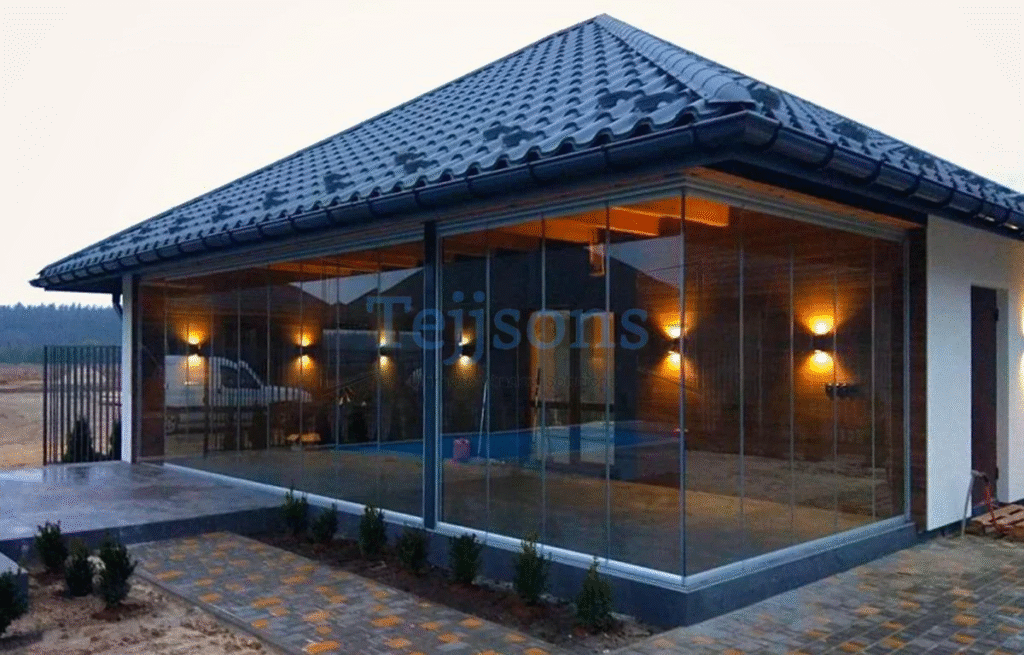
Every part of a Tejjsons window is built to perform in India’s unpredictable and often aggressive monsoon climate. From smart framing systems to tight-locking hardware, here’s what makes our aluminium sliding windows monsoon-ready.
1. Tightly Engineered Aluminium Window Frames
Precision-engineered aluminium window frames form the first line of defense. The snug fit and seamless profile reduce the chances of rain seeping through unwanted gaps. Tejjsons uses premium-grade aluminium that doesn’t swell or warp with moisture, something timber or low-grade PVC frames often struggle with during the rains. The frame design supports consistent alignment, even during prolonged wet spells.
2. Internal Water Drainage Channels
Each aluminium sliding window or casement window is designed with hidden but efficient drainage paths. These integrated channels direct water away from the sill and out through concealed weep holes. Instead of pooling around your tracks or spilling indoors, rainwater is silently drained out to protect both the window and the surrounding structure.

2. Seamless Glass Fitting for Leak Protection
In monsoon weather, water finds its way through even the smallest gaps. That’s why Tejjsons focuses on airtight glass fitting in every aluminium window. The smooth contact between frame and glass reduces the risk of leaks, misting, or unwanted airflow during heavy rain. Your interiors stay dry, and the view stays uninterrupted.
3. Smart Sliding Window Design With Seamless Closure
For monsoon-heavy regions, precision in closure makes a noticeable difference. Tejjsons’ premium Maglev aluminium sliding window solutions feature quiet-glide technology with magnet-assisted alignment. These designs make sure that the window shuts cleanly every time, reducing gaps that might otherwise let in rain or air drafts. This is particularly helpful in high-altitude or beachfront homes.
4. Streamlined Panel Orientation Supports Vertical Drainage
For high-rise or balcony-facing spaces, vertical orientation helps rainwater slide off quickly. This makes our vertical sliding aluminium windows an excellent fit for locations where wind and water come at steep angles. Paired with flush finishes and clean edges, the water simply flows off without lingering or leaking.
You can Also Read our new article on: A Complete Buyer’s Guide For Aluminium Windows In India
Other Benefits of Tejjsons’ Aluminium Windows During Monsoon
Along with shielding your home from rain, Tejjsons’ aluminium windows bring everyday functionality and refined utility to the forefront in challenging weather conditions. Here’s what sets them apart during the monsoon.
1. Low-Maintenance Aluminium Window Frames
Tejjson’s aluminium window frames don’t peel, rot, or rust, even after years of exposure to monsoon air. Unlike wood or iron alternatives, these frames are made to endure the damp, sticky climate found in many Indian cities. They hold their shape and finish, which means fewer repairs, no repainting hassles, and a consistently clean appearance throughout the season.
2. Smooth Operation in Humid Conditions
Stuck windows are a common problem when the rains arrive. However, with Tejjsons’ motorised aluminium windows, daily use stays effortless. The high-quality runners glide smoothly across the track, even in rooms with high humidity or temperature swings. That makes them a practical choice for everything from sea-facing apartments to high-rise kitchens and bath spaces.
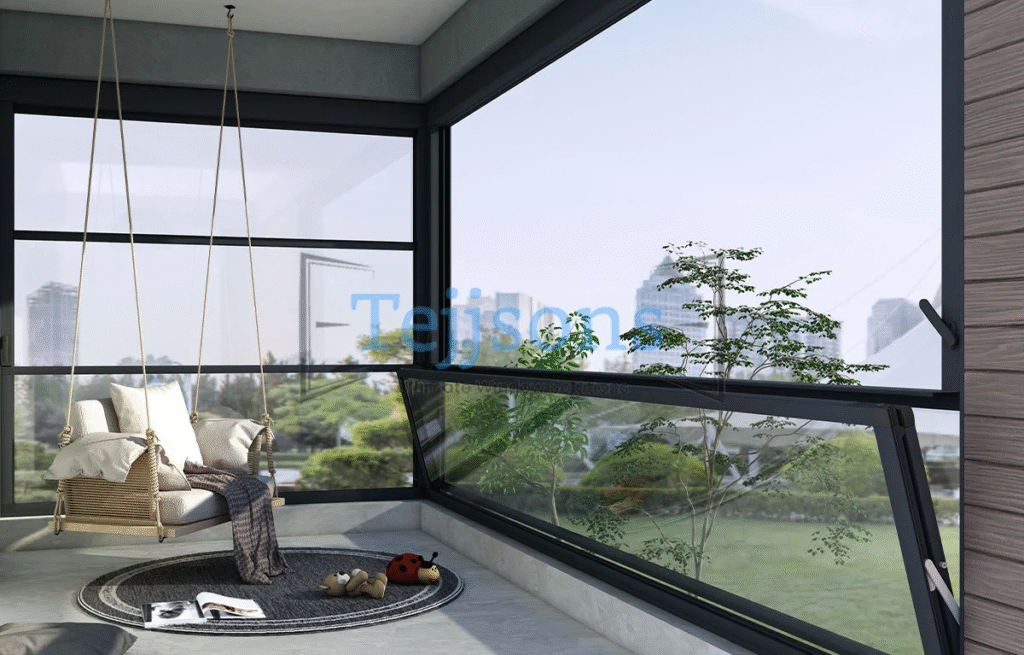
3. Bright Interiors With Aluminium Glass Sliding Windows
Cloudy days don’t have to mean gloomy interiors. Tejjsons’ aluminium glass sliding windows bring in maximum natural light with wide, clear panels that brighten up even compact rooms. This thoughtful sliding window design helps reduce dependence on artificial lighting during the monsoon, while also giving your interiors a breathable, airy feeling.
4. Seamless Integration With Outdoor Extensions
When building semi-open outdoor areas, like patios or terraces, Tejjsons’ aluminium sliding windows pair perfectly with zip screens or bioclimatic pergolas. The transition between indoor and outdoor zones feels more functional, and the space stays usable no matter how the skies turn. It’s a smart option for anyone designing multi-purpose entertainment areas or garden lounges.
5. Long-Term Aesthetic and Functional Value
Tejjson’s aluminium window design doesn’t just serve during one season; it’s a long-term architectural asset. With corrosion-resistant finishes, dependable hardware, and wide compatibility with modern facades, these house aluminium windows retain their visual and structural integrity through years of heavy use and weather extremes. This translates into better ROI and fewer worries season after season. That’s why our ultra-slim aluminium windows are a crowd favourite.
Also Read: Why Ultra Slimline Aluminium Windows Are the First Choice for Luxury Architects
How to Choose the Right Aluminium Windows for Rain Protection
Choosing the right aluminium window is less about guesswork and more about matching design to performance. Here’s what to check before installing.
- Prioritise water drainage design: Look for aluminium window designs with inbuilt drainage slots or water escape paths to avoid pooling or overflow during heavy rains.
- Go for sliding systems over casement: Aluminium sliding windows are better suited for monsoon-prone areas as they close flush and don’t swing open into heavy wind or rain.
- Check for glass stability and thickness: Choose aluminium glass sliding windows with toughened or laminated glass to prevent shattering in stormy conditions.
- Evaluate frame construction quality: Well-structured aluminium window frames reduce movement, rattling, and long-term alignment issues caused by weather strain.
- Match the window to the room’s purpose: Install larger aluminium glass windows in shared areas and use compact sliding windows for house corners like kitchens and bathrooms.
- Consider external sealing options: Windows that can be paired with external shading or shielding, like zip screens or pergolas, give extra weather protection.
Tejjsons Recommends: Fully automate your aluminium windows & doors by pairing them with our easy-to-operate Integral Blinds

Why Choose Tejjsons’ Aluminium Windows for Your Luxury Homes
Rain shouldn’t be a reason to compromise on comfort, design, or functionality. Tejjsons combines smart window engineering with reliable weather performance to help your interiors stay dry, bright, and easy to live in year after year. From slimline aluminium windows in large living rooms to compact sliding window for house balconies, each product is crafted with rain readiness in mind.
Our portfolio includes everything from classic aluminium glass windows to tech-forward upgrades like magnetic levitation and remote-control mechanisms. These aren’t add-ons, they’re part of our core design philosophy for modern Indian homes. Every aluminum window design is shaped to handle seasonal changes without swelling, warping, or compromising on visual appeal.
Ready to rainproof your space without giving up on beauty or comfort?
Get in touch with Tejjsons for a personalised window consultation today.
FAQs
Are designer home windows available with rainproof features?
Yes. At Tejjsons, you’ll find rainproof aluminium windows that combine performance and premium design. These aluminium glass window systems are engineered for harsh monsoons while still complementing the luxury aesthetics of your home.
How frequently should aluminium sliding window tracks be cleaned in the rainy season?
During the monsoon, clean your aluminium sliding window tracks at least once every 10–14 days. This prevents debris buildup and keeps drainage smooth so water doesn’t accumulate or seep indoors.
What are the benefits of aluminium sliding windows during the monsoon?
Aluminium sliding windows are ideal for rainy weather because they seal tight, don’t swing open into wind or rain, and reduce the risk of leaks. Their smart drainage and glide function make them a reliable choice for wet conditions.
How often should aluminium windows be serviced for weather protection?
Inspect and service aluminium windows twice a year, before and after monsoon. This helps maintain frame alignment, track movement, and glass integrity so your waterproof aluminium windows stay functional season after season.
Can Tejjsons aluminium windows be installed in coastal areas?
Absolutely. Our aluminium window frames are designed to handle high humidity and salty air. They’re suitable for coastal properties where corrosion resistance and storm-readiness are non-negotiable.


